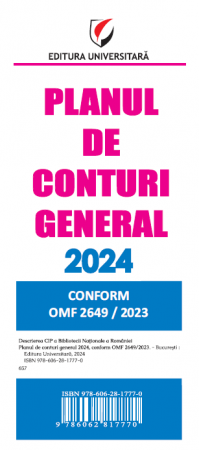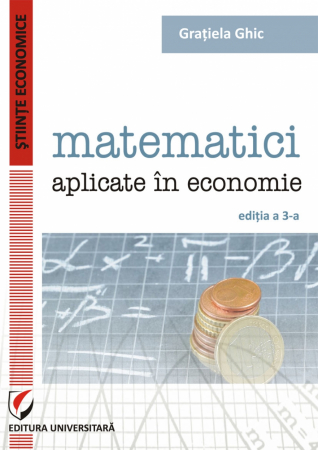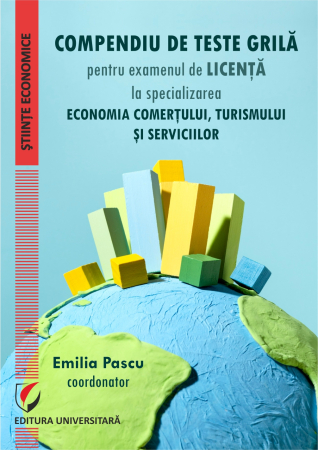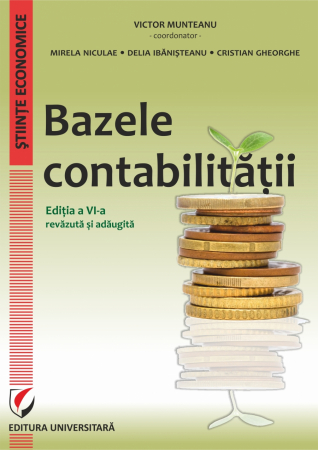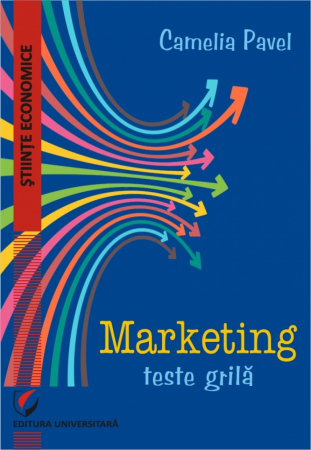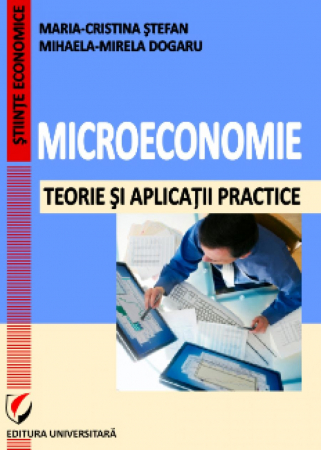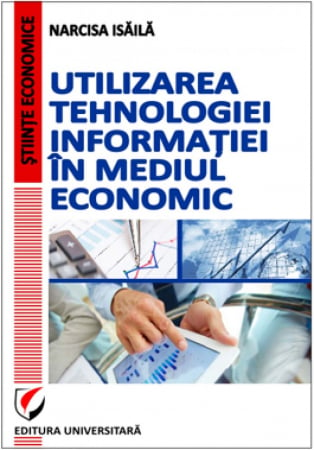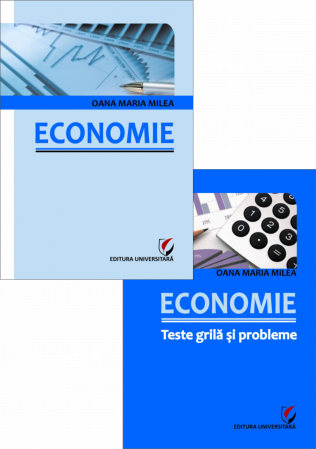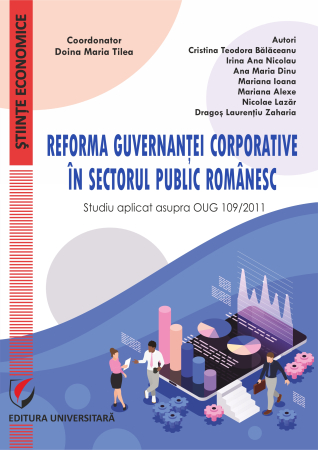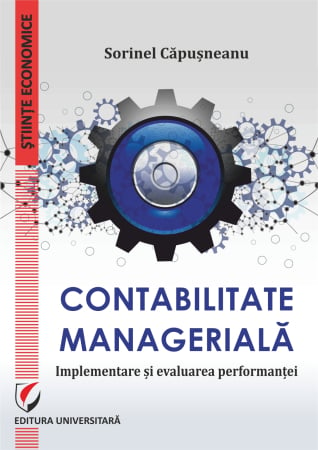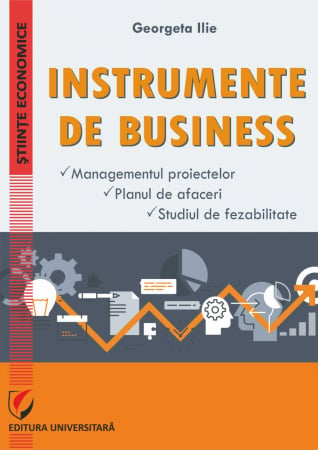Manuscript proposals: [email protected] / 0745 204 115 //// Tracking orders Individuals / Sales: 0745 200 357 / Orders Legal entities: 0721 722 783
Publisher: Editura Universitară
Author: Simona Moagar-Poladian, Napoleon Pop
ISBN: 978-606-28-0323-0
DOI: 10.5682/9786062803230
Publisher year: 2015
Edition: I
Pages: 406
Product Code:
9786062803230
Do you need help?
0745 200 357
- Description
- Download (1)
- Authors
- Content
- More details
- Reviews (0)
This volume contains the most important synthesis papers prepared by experts of the Institute of World Economy, based on analyzes of major international events that have influenced the economic policy measures adopted, with global and regional effect in 2014-2015.
Structured in four chapters, this volume starts from the major trends of global governance, so that in the following chapters the analyzes focus on the evolution of trade in goods of the EU and, implicitly, of Romania, the policy of reindustrialization of Europe, the partnership eastern EU, Chinese investment in mainland Europe and especially in Central and Eastern Europe.
Structured in four chapters, this volume starts from the major trends of global governance, so that in the following chapters the analyzes focus on the evolution of trade in goods of the EU and, implicitly, of Romania, the policy of reindustrialization of Europe, the partnership eastern EU, Chinese investment in mainland Europe and especially in Central and Eastern Europe.
-
ROMANIA SI FENOMENELE MAJORE DIN ECONOMIA EUROPEANA SI GLOBALA, Vol. II
Download
Coordinator
SIMONA MOAGAR-POLADIAN
NAPOLEON POP
SIMONA MOAGAR-POLADIAN
NAPOLEON POP
CHAPTER I
INTERNATIONAL TRADE: CHANGES AND TRENDS / 15
ACCELERATING THE EXPANSION OF INTERNATIONAL TRADE IN 2014-2015 AFTER TWO YEARS OF SLOW GROWTH
Dr. Agnes GHIBUTIU / 16
NEW TRENDS IN INTERNATIONAL GOVERNANCE
Dr. Agnes GHIBUTIU / 39
EVOLUTIONS, MUTATIONS AND TRENDS IN WORLD TRADE IN GOODS. STRUCTURAL AND CONJUNCTURAL DETERMINANTS
Dr. Iulia Monica OEHLER-SINCAI / 63
START OF NEGOTIATIONS TO AGREE ON A MULTILATERAL AGREEMENT ON TRADE IN SERVICES: THE TISA AGREEMENT
Dr. Elisabeta Agneta GHIBUTIU / 83
CHAPTER II
EUROPEAN UNION: NEW DIRECTIONS AND PARTNERSHIPS / 107
OVERVIEW OF EU AND ROMANIA TRADE IN GOODS
Dr. Iulia Monica OEHLER-SINCAI / 108
EU AND ROMANIA REINDUSTRIALIZATION POLICY
Dr. Petre PRISECARU, Mariana PAPATULICA, Dr. Alina Ligia DUMITRESCU, Dr. Paul CALANTER / 127
COMMON AGRICULTURAL POLICY IN THE PERIOD 2014-2020 - A PARTNERSHIP BETWEEN THE EUROPEAN COMMISSION AND FARMERS
Dr. Andreea DRAGOI / 161
EUROPEAN UNION - EASTERN PARTNERSHIP: COMMENTS ON THE THIRD SUMMIT
Dr. Iulia Monica OEHLER-SINCAI / 171
RECENT ENVIRONMENTAL POLICY DEVELOPMENTS IN THE EUROPEAN UNION
Dr. Petre PRISECARU and Dr. Paul CALANTER / 183
CHINESE INVESTMENTS IN ROMANIA AND CENTRAL AND EUROPEAN COUNTRIES (EEC)
Dr. Sarmiza PENCEA, Dr. Iulia Monica OEHLER-SINCAI / 215
EUROPEAN COMMISSION: ADOPTION OF NEW STATE AID GUIDELINES
Dr. Lucia IORDACHE / 235
CHAPTER III
EU ENERGY SECURITY IN THE NEW GEOPOLITICAL CONDITIONS / 243
EUROPEAN UNION SEARCHING SOLUTIONS TO REDUCE RISK DEPENDENCE IN RUSSIA
Mariana PAPATULICA / 244
ASSESSMENTS ON THE CONCLUSIONS OF THE EUROPEAN COUNCIL OF JUNE 2014, ON THE INCREASE OF EU ENERGY SECURITY
Mariana PAPATULICA / 273
SOURCES AND ROUTES FOR SUPPLYING EU NATURAL GASES, ALTERNATIVE TO IMPORTS FROM RUSSIA
Mariana PAPATULICA / 288
GAS PERSPECTIVES IN THE MIDDLE AND NEAR EAST. IMPLICATIONS ON OIL AND GAS MARKETS, OF A POSSIBLE AGREEMENT BETWEEN IRAN AND WESTERN STATES, ON THE NUCLEAR PROBLEM
Mariana PAPATULICA / 319
CONFLICTING US-RUSSIA INTERESTS ON THE EUROPEAN GAS MARKET; ECONOMIC AND GEOPOLITICAL IMPLICATIONS OF THE CRIMIS CRISIS
Mariana PAPATULICA / 330
CHAPTER IV
EUROPEAN UNION: VULNERABILITIES DUE TO REGIONAL GEOPOLITICAL TENSIONS / 343
DAVOS WORLD ECONOMIC FORUM, 2014
Dr. Iulia Monica OEHLER-SINCAI / 344
BREXIT: ECONOMIC AND POLITICAL IMPACT
Dr. Simona MOAGAR-POLADIAN, George-Cornel DUMITRESCU, Drd. Ionela BALTATESCU, Emilia-Mary BALAN, Mariana-Camelia TARANU, Alexandra RUSU, Cristinel Claudiu COCOSATU / 357
RUSSIA - RETHINKING THE GEOPOLITICAL STRATEGY. REGIONAL AND INTERNATIONAL CONSEQUENCES
Dr. Andreea DRAGOI / 381
RUSSIA - POST SANCTIONS. IMPLICATIONS OF TENSIONS WITH THE EU AND THE USA ON THE EVOLUTION OF THE ECONOMY IN 2014
Dr. Andreea DRAGOI / 393
INTERNATIONAL TRADE: CHANGES AND TRENDS / 15
ACCELERATING THE EXPANSION OF INTERNATIONAL TRADE IN 2014-2015 AFTER TWO YEARS OF SLOW GROWTH
Dr. Agnes GHIBUTIU / 16
NEW TRENDS IN INTERNATIONAL GOVERNANCE
Dr. Agnes GHIBUTIU / 39
EVOLUTIONS, MUTATIONS AND TRENDS IN WORLD TRADE IN GOODS. STRUCTURAL AND CONJUNCTURAL DETERMINANTS
Dr. Iulia Monica OEHLER-SINCAI / 63
START OF NEGOTIATIONS TO AGREE ON A MULTILATERAL AGREEMENT ON TRADE IN SERVICES: THE TISA AGREEMENT
Dr. Elisabeta Agneta GHIBUTIU / 83
CHAPTER II
EUROPEAN UNION: NEW DIRECTIONS AND PARTNERSHIPS / 107
OVERVIEW OF EU AND ROMANIA TRADE IN GOODS
Dr. Iulia Monica OEHLER-SINCAI / 108
EU AND ROMANIA REINDUSTRIALIZATION POLICY
Dr. Petre PRISECARU, Mariana PAPATULICA, Dr. Alina Ligia DUMITRESCU, Dr. Paul CALANTER / 127
COMMON AGRICULTURAL POLICY IN THE PERIOD 2014-2020 - A PARTNERSHIP BETWEEN THE EUROPEAN COMMISSION AND FARMERS
Dr. Andreea DRAGOI / 161
EUROPEAN UNION - EASTERN PARTNERSHIP: COMMENTS ON THE THIRD SUMMIT
Dr. Iulia Monica OEHLER-SINCAI / 171
RECENT ENVIRONMENTAL POLICY DEVELOPMENTS IN THE EUROPEAN UNION
Dr. Petre PRISECARU and Dr. Paul CALANTER / 183
CHINESE INVESTMENTS IN ROMANIA AND CENTRAL AND EUROPEAN COUNTRIES (EEC)
Dr. Sarmiza PENCEA, Dr. Iulia Monica OEHLER-SINCAI / 215
EUROPEAN COMMISSION: ADOPTION OF NEW STATE AID GUIDELINES
Dr. Lucia IORDACHE / 235
CHAPTER III
EU ENERGY SECURITY IN THE NEW GEOPOLITICAL CONDITIONS / 243
EUROPEAN UNION SEARCHING SOLUTIONS TO REDUCE RISK DEPENDENCE IN RUSSIA
Mariana PAPATULICA / 244
ASSESSMENTS ON THE CONCLUSIONS OF THE EUROPEAN COUNCIL OF JUNE 2014, ON THE INCREASE OF EU ENERGY SECURITY
Mariana PAPATULICA / 273
SOURCES AND ROUTES FOR SUPPLYING EU NATURAL GASES, ALTERNATIVE TO IMPORTS FROM RUSSIA
Mariana PAPATULICA / 288
GAS PERSPECTIVES IN THE MIDDLE AND NEAR EAST. IMPLICATIONS ON OIL AND GAS MARKETS, OF A POSSIBLE AGREEMENT BETWEEN IRAN AND WESTERN STATES, ON THE NUCLEAR PROBLEM
Mariana PAPATULICA / 319
CONFLICTING US-RUSSIA INTERESTS ON THE EUROPEAN GAS MARKET; ECONOMIC AND GEOPOLITICAL IMPLICATIONS OF THE CRIMIS CRISIS
Mariana PAPATULICA / 330
CHAPTER IV
EUROPEAN UNION: VULNERABILITIES DUE TO REGIONAL GEOPOLITICAL TENSIONS / 343
DAVOS WORLD ECONOMIC FORUM, 2014
Dr. Iulia Monica OEHLER-SINCAI / 344
BREXIT: ECONOMIC AND POLITICAL IMPACT
Dr. Simona MOAGAR-POLADIAN, George-Cornel DUMITRESCU, Drd. Ionela BALTATESCU, Emilia-Mary BALAN, Mariana-Camelia TARANU, Alexandra RUSU, Cristinel Claudiu COCOSATU / 357
RUSSIA - RETHINKING THE GEOPOLITICAL STRATEGY. REGIONAL AND INTERNATIONAL CONSEQUENCES
Dr. Andreea DRAGOI / 381
RUSSIA - POST SANCTIONS. IMPLICATIONS OF TENSIONS WITH THE EU AND THE USA ON THE EVOLUTION OF THE ECONOMY IN 2014
Dr. Andreea DRAGOI / 393
This volume contains the most important synthesis papers prepared by experts of the Institute of World Economy, based on analyzes of major international events that have influenced the economic policy measures adopted, with global and regional effect in 2014-2015.
Structured in four chapters, this volume starts from the major trends of global governance, so that in the following chapters the analyzes focus on the evolution of trade in goods of the EU and, implicitly, of Romania, the policy of reindustrialization of Europe, the partnership eastern EU, Chinese investment in mainland Europe and especially in Central and Eastern Europe.
Chapter III is entirely dedicated to energy security in the European Union, being developed entirely by an expert with over 40 years of experience on this topic, of great interest for the economic and social development of a country. In this chapter, we analyze the solutions that the European Union currently has at hand to achieve energy independence from Russia.
Chapter IV focuses on the delicate issues currently facing the European Union: the possible transformation by the exit of some states, as well as the tensions escalated by the occupation of Crimea by the Russian Federation and the related sanctions, applied by the European Union and the USA. According to the authors of this volume, the international financial and economic crisis, which began in 2008, gradually led to a slowdown in the process of global trade liberalization. There is a particular proliferation of regionalization, which means highlighting the tendencies of protectionism among groups of states. In the perspective of relaunching world trade, it is desirable to restore the role of the World Trade Organization (WTO) in promoting trade opening and economic cooperation between the states of the world.
Currently, we live in a world where, unfortunately, preferential regimes are being promoted, based on the conclusion of alliances of mega-regions, in the desire to promote their own national interests as well as possible. As an example, we remind you that in recent years a series of plurilateral negotiations have been launched in this regard. Thus, among the most important we mention: the EU-Japan Free Trade Agreement; Trans-Pacific Partnership (TPP) (including 12 developed and emerging Asian-Pacific countries); the new Agreement on Trade in Services (TISA Agreement); Transatlantic Trade and Investment Partnership (TTIP) between the EU and the US; negotiations between the EU and China with a view to concluding an investment agreement; Trans-Pacific Partnership (TPP); Comprehensive Regional Economic Partnership (RCEP). The authors' conclusions focus on accentuating the fragmentation process as an effect of the substantial proliferation of preferential trade agreements.
The second chapter refers especially to Romania's position in the world trade ranking, as well as the new trends in terms of economic development in the European Union. It is worth noting the conclusion that emerges, namely the fact that Romania is among the EU countries that participate least in the global value-added chains, although in the last decade we are witnessing an accelerated growth of its trade.
Another issue analyzed by the specialists of the Institute of World Economy is that of attracting foreign direct investment. In the years since the outbreak of the international financial crisis, we have seen a substantial reduction in foreign direct investment (FDI) globally. However, it is noticeable that from a structural point of view we are witnessing a change of direction. More precisely, the foreign investments employed by China have had and continue to have an accelerated dynamic, currently competing with the developed countries of the world, especially with the USA. Given this trend, European countries, especially those in Central and Eastern Europe, including Romania, are fighting hard to convince large Chinese companies to be their investment destination. However, the authors point out that Romania, although it started in this race as a favorite, at present, in the absence of a national strategy aimed at attracting FDI from China, lost in favor of neighboring states. One subject of study in one chapter of the book is the European Union's energy security in the current tense relations with Russia, which has led European leaders to consider diversifying supply routes by creating an energy union. The European Union is looking for new suppliers through which to ensure growing demand and security of supply. In Chapter III, it is emphasized that, “the real stake of all wars against world terrorism, of Russian militarism, of US intervention in regional conflicts was certainly, although less recognized, an economic one, more precisely, the access to resources, especially energy, and ensuring control over their transport routes to markets ”. The main actors in this energy war were the USA and Russia, the target market - the EU, and the optimal sources to ensure an alternative to the EU's excessive dependence on Russia are the Caspian region (including Iran), the Middle East (Eastern Mediterranean). ) and the Middle East.
The "energy war" is about to intensify: on the one hand, the conflict in Syria, the intention of the interested parties being to take control of a key sector of the future transport corridor for gas delivery from the Middle East to Europe, with as local key players - Iran and Qatar. On the other hand, the conflict in Ukraine, settled by Russia, in its favor, will give it the opportunity to consolidate its positions in the direction of European gas. "
The last chapter contains a series of analyzes on some of the weaknesses that the European Union currently has, as an effect of geopolitical tensions. A neuralgic point is the relations with Russia after the occupation of Crimea. Russia wants to regain its position as regional leader, lost after the dissolution of the Soviet Union in 1991, an event considered by Vladimir Putin to be "the greatest geopolitical catastrophe of the twentieth century."
In this last chapter, the authors analyze Russia's strategic reorientation towards China and India, which is based on the fact that both states have similar approaches to key international issues, which is one of the guarantees of stability of the future partnership.
Structured in four chapters, this volume starts from the major trends of global governance, so that in the following chapters the analyzes focus on the evolution of trade in goods of the EU and, implicitly, of Romania, the policy of reindustrialization of Europe, the partnership eastern EU, Chinese investment in mainland Europe and especially in Central and Eastern Europe.
Chapter III is entirely dedicated to energy security in the European Union, being developed entirely by an expert with over 40 years of experience on this topic, of great interest for the economic and social development of a country. In this chapter, we analyze the solutions that the European Union currently has at hand to achieve energy independence from Russia.
Chapter IV focuses on the delicate issues currently facing the European Union: the possible transformation by the exit of some states, as well as the tensions escalated by the occupation of Crimea by the Russian Federation and the related sanctions, applied by the European Union and the USA. According to the authors of this volume, the international financial and economic crisis, which began in 2008, gradually led to a slowdown in the process of global trade liberalization. There is a particular proliferation of regionalization, which means highlighting the tendencies of protectionism among groups of states. In the perspective of relaunching world trade, it is desirable to restore the role of the World Trade Organization (WTO) in promoting trade opening and economic cooperation between the states of the world.
Currently, we live in a world where, unfortunately, preferential regimes are being promoted, based on the conclusion of alliances of mega-regions, in the desire to promote their own national interests as well as possible. As an example, we remind you that in recent years a series of plurilateral negotiations have been launched in this regard. Thus, among the most important we mention: the EU-Japan Free Trade Agreement; Trans-Pacific Partnership (TPP) (including 12 developed and emerging Asian-Pacific countries); the new Agreement on Trade in Services (TISA Agreement); Transatlantic Trade and Investment Partnership (TTIP) between the EU and the US; negotiations between the EU and China with a view to concluding an investment agreement; Trans-Pacific Partnership (TPP); Comprehensive Regional Economic Partnership (RCEP). The authors' conclusions focus on accentuating the fragmentation process as an effect of the substantial proliferation of preferential trade agreements.
The second chapter refers especially to Romania's position in the world trade ranking, as well as the new trends in terms of economic development in the European Union. It is worth noting the conclusion that emerges, namely the fact that Romania is among the EU countries that participate least in the global value-added chains, although in the last decade we are witnessing an accelerated growth of its trade.
Another issue analyzed by the specialists of the Institute of World Economy is that of attracting foreign direct investment. In the years since the outbreak of the international financial crisis, we have seen a substantial reduction in foreign direct investment (FDI) globally. However, it is noticeable that from a structural point of view we are witnessing a change of direction. More precisely, the foreign investments employed by China have had and continue to have an accelerated dynamic, currently competing with the developed countries of the world, especially with the USA. Given this trend, European countries, especially those in Central and Eastern Europe, including Romania, are fighting hard to convince large Chinese companies to be their investment destination. However, the authors point out that Romania, although it started in this race as a favorite, at present, in the absence of a national strategy aimed at attracting FDI from China, lost in favor of neighboring states. One subject of study in one chapter of the book is the European Union's energy security in the current tense relations with Russia, which has led European leaders to consider diversifying supply routes by creating an energy union. The European Union is looking for new suppliers through which to ensure growing demand and security of supply. In Chapter III, it is emphasized that, “the real stake of all wars against world terrorism, of Russian militarism, of US intervention in regional conflicts was certainly, although less recognized, an economic one, more precisely, the access to resources, especially energy, and ensuring control over their transport routes to markets ”. The main actors in this energy war were the USA and Russia, the target market - the EU, and the optimal sources to ensure an alternative to the EU's excessive dependence on Russia are the Caspian region (including Iran), the Middle East (Eastern Mediterranean). ) and the Middle East.
The "energy war" is about to intensify: on the one hand, the conflict in Syria, the intention of the interested parties being to take control of a key sector of the future transport corridor for gas delivery from the Middle East to Europe, with as local key players - Iran and Qatar. On the other hand, the conflict in Ukraine, settled by Russia, in its favor, will give it the opportunity to consolidate its positions in the direction of European gas. "
The last chapter contains a series of analyzes on some of the weaknesses that the European Union currently has, as an effect of geopolitical tensions. A neuralgic point is the relations with Russia after the occupation of Crimea. Russia wants to regain its position as regional leader, lost after the dissolution of the Soviet Union in 1991, an event considered by Vladimir Putin to be "the greatest geopolitical catastrophe of the twentieth century."
In this last chapter, the authors analyze Russia's strategic reorientation towards China and India, which is based on the fact that both states have similar approaches to key international issues, which is one of the guarantees of stability of the future partnership.
If you want to express your opinion about this product you can add a review.
write a review

6359.png)
![Romania and Major Phenomena in European and Global Economy, Vol. II [1] Romania and Major Phenomena in European and Global Economy, Vol. II [1]](https://gomagcdn.ro/domains/editurauniversitara.ro/files/product/large/romania-si-fenomenele-majore-din-economia-europeana-si-globala-vol-ii-669-159912.jpg)
